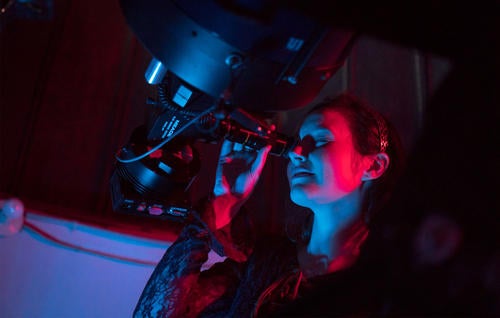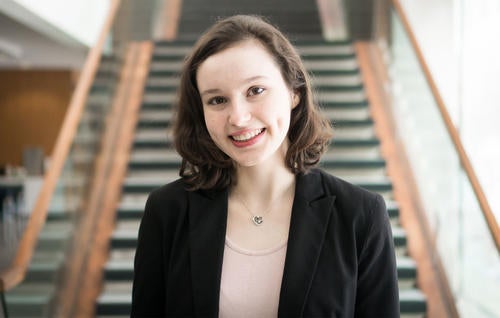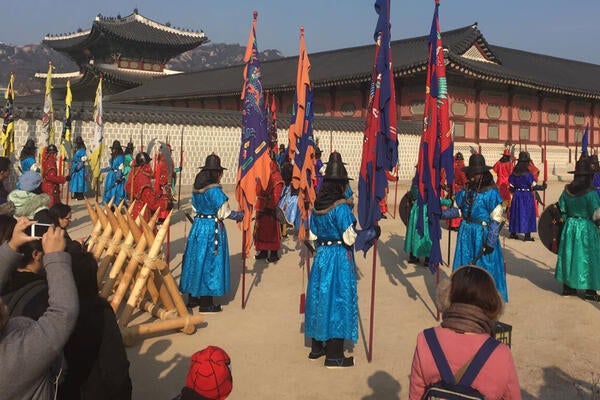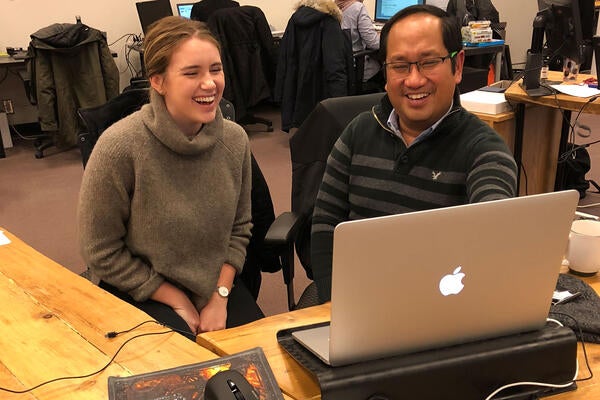
Waterloo Science student wins co-op triple crown
Astronomy and Physics student, Emily Pass, wins faculty, provincial and national Co-op Student of the Year Awards.

Astronomy and Physics student, Emily Pass, wins faculty, provincial and national Co-op Student of the Year Awards.
By Katharine Tuerke Faculty of ScienceMarch 19 – 23 is National Co-op Week and Work-Integrated Learning (WIL) Week, and the University of Waterloo is celebrating its students’ co-op and WIL opportunities.
We're proud to kick things off with Emily Pass, a third-year Science undergraduate student who is a recipient of the National Co-op of the Year Award for developing a data analysis program that rapidly detects objects in the Kuiper Belt, a region of space beyond Neptune. Pass has also won awards at the provincial and faculty levels.
Co-operative Education and Work-Integrated Learning Canada (CEWIL) named Emily Pass, from the Faculty of Science at Waterloo, the winner of the national Co-op Student of the Year Award. Pass is the third Waterloo student to win the CEWIL award in the last four years. She also won the top prize in the province, the Education at Work Ontario (EWO) Co-op Student of the Year Award, as well as the Waterloo Faculty of Science Co-op Student of the Year Award.

This summer, Pass worked as a research assistant at Western's Centre for Planetary Science and Exploration. She designed and implemented the software, algorithm and code for the telescope array, Colibri. The new technology monitors light curves for geometric diffraction patterns, allowing scientists to know the size and orientation of an object that passes through an area of space. Her findings were published in a 13-page paper in the academic journal, Publications of the Astronomical Society of the Pacific, a well-respected publication in the field.
Pass credits her first co-op work term as a quality assurance developer for Validus Research Inc. for her success in developing Colibri’s rapid-imaging program. The field of quality assurance changed the way she thought of testing and problem-solving.
“You have to think about how something could go wrong, how to test it and the possible outcomes,” said Pass, a Schulich Leader. “You have to do a deep think of the problem before starting on the solution.”
Since then, her work terms have explored different areas of astronomy. She has worked as a research assistant at Dalhousie University investigating galaxy protoclusters, Kuiper Belt objects at Western and next summer she’ll study exoplanet atmospheres at McGill.

Although Pass developed a passion for astronomy in elementary school, she didn’t take a physics class until her first semester at Waterloo. The first midterm didn’t go well and while others thought the course was easy, Pass questioned her choice to major in astronomy. She persevered and each subsequent test was better.
“If I had given up then, I wouldn’t have had all these wonderful experiences and opportunities,” said Pass.
The CEWIL leads National Co-op and Work-Integrated Learning Week, which celebrates the growth of co-operative education and work-integrated programs across the country. Waterloo is the world leader in Co-operative education, and is home to the world’s largest co-op program.

Read more
Second-year mathematical physics student heads to South Korea for unforgettable co-op experience.

Read more
Third-year Environment, Resources and Sustainability student Hannah Dubber kicks off her co-op in Kitchener as Program Coordinator with Sustainable Waterloo Region.

Read more
Third-year Honours Arts student Aaron Cole excels in Waterloo's new work-integrated learning and experiential education certificate program, EDGE.
The University of Waterloo acknowledges that much of our work takes place on the traditional territory of the Neutral, Anishinaabeg, and Haudenosaunee peoples. Our main campus is situated on the Haldimand Tract, the land granted to the Six Nations that includes six miles on each side of the Grand River. Our active work toward reconciliation takes place across our campuses through research, learning, teaching, and community building, and is co-ordinated within the Office of Indigenous Relations.